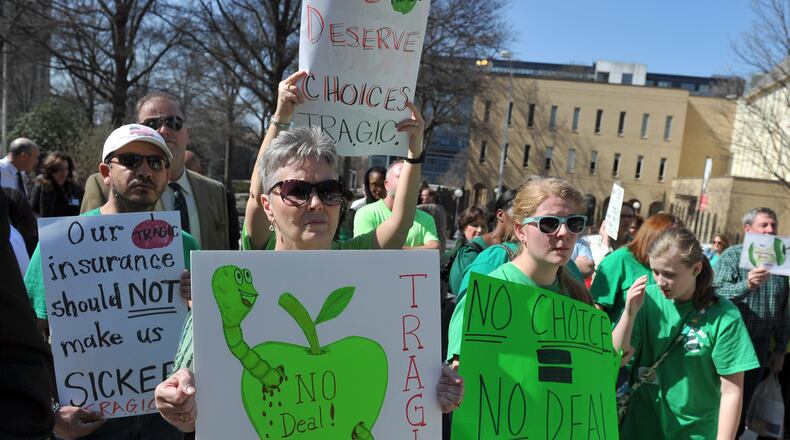Health care costs always seem to be rising, but Georgia teachers and state employees may not notice in 2019.
The Department of Community Health, which runs the 650,000-member State Health Benefit Plan, won approval from its board Thursday to keep premiums flat for the upcoming year for teachers and state employees. They also won’t see an increase in deductibles or co-pays.
Some education and state government retirees in the $3.2 billion plan will see their Medicare Advantage rates jump, while others will experience decreases or no changes, based on the type of plan they choose.
Jeff Rickman, who oversees the SHBP for the agency, said the program — which is funded by taxpayers and premiums paid by those who are covered — would also add enhanced mental health benefits and had begun a weight-loss pilot program.
Rickman told the board, “We’ve had some good years in the financial stability of the plan overall.”
Only last year DCH officials were projecting a $242 million shortfall for the plan in fiscal 2020, which begins July 1, if no changes were made.
But Rickman said the agency has seen cost savings in several areas, including by changing the manager of pharmacy benefits for plan members.
Dan Ebersole, a retired state treasurer who serves on the plan’s advisory counsel, said his group was recently given details of the agency proposal for 2019. He said the meeting was relatively straightforward.
“Good news doesn’t require discussion,” Ebersole said. When a board member asked him for his reaction, he said, “I’m ecstatic.”
Some plan members said they expected favorable news because 2018 is an election year, when voters will choose a new governor, lieutenant governor and General Assembly.
At a similar meeting in 2014, the last time there were elections for statewide offices, DCH announced premiums would remain the same or even go down for some plan members. That meeting was held after months of protest by teachers, state employees and retirees over changes in the plan.
A few months later, after the election, the governor proposed eliminating state-supported health care benefits for part-time school staffers, including bus drivers. Now, bus drivers can get the coverage, but school districts pay the cost.
The stable premiums will be especially good news for teachers and state employees in 2019 because the General Assembly didn’t approve cost-of-living pay raises this year. Some teachers received longevity raises.
John Palmer, a Cobb County educator and spokesman for Teachers Rally to Advocate for Georgia Insurance Choices, said in an email: “We are pleased that the costs of and services provided by the SHBP will at least remain stable for this upcoming (election) year. However, even though we have built back the plan reserves and the economy is booming, the state has not restored any of the cuts to the plan designs and price structure that we were told were necessary during the recession.”
Palmer said some school systems are having a hard time affording insurance for staffers.
“This is having a significant impact on districts’ ability to recruit and retain critical education support staff such as custodians, bus drivers, and school secretaries,” he said.
Premiums for at least some retirees on the State Health Benefit Plan could rise in 2019.
Premiums for supplemental Medicare coverage would go down or remain unchanged if retirees choose the standard plan offered by Anthem Blue Cross and Blue Shield or the premium plan offered by UnitedHealthcare. Premiums would shoot up for Anthem’s premium plan and UnitedHealthcare’s standard plan.
Health care costs have continued to increase for years.
According to the Medical Cost Trend report released in June from PwC’s Health Research Institute, employers and insurers are expecting a 6 percent jump in health care costs in 2019, slightly above the increases seen in the past five years. Those costs tend to be passed on to employees in terms of higher premiums, deductibles and co-pays.
Some members of the DCH board suggested the agency look into allowing employees to create medical savings accounts. MSAs provide people with tax-advantaged accounts to pay health care bills.
Such accounts are often coupled with high-deductible health insurance plans. Money from the accounts can fill in the gaps created by the high deductibles. The issue came up after DCH officials said relatively few members of the State Health Benefit Plan choose high-deductible plans.
State Health Benefit Plan
About 650,000 teachers, state employees, retirees and family members receive their health insurance through the State Health Benefit Plan. In recent years, rates have increased less than many comparable private-sector insurance premiums.
Average increase for teachers and state employees
2017: 2.5 percent
2018: 3.7 percent
2019: 0 percent
Source: Georgia Department of Community Health
About the Author
Keep Reading
The Latest
Featured




